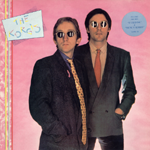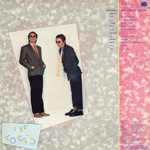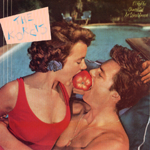THE KORGIS (TENOR 101) · Press Release
 THE KORGIS' debut album comes in the finest tradition of British pop music. It's a set of vibrant tunes, brimming with character and imagination, a reflection of the economic brilliance of its makers, James Warren and Andy Davis.
THE KORGIS' debut album comes in the finest tradition of British pop music. It's a set of vibrant tunes, brimming with character and imagination, a reflection of the economic brilliance of its makers, James Warren and Andy Davis.
Warren and Davis have been companions in music for years and though their personalities appear to be acutely contrasting, when it comes to creating tunes, the life-lines definitely meet.
It is no accident, for instance, that THE KORGIS is an album of two molds, almost schizophrenic in concept. For the opening side, we're treated to a healthy dose of Davis' interesting romantic themes, learning that deep down he's just an old lover-boy in search of colorful backdrops. Flip it over and James Warren's eccentric quirkiness floats to the surface with tunes like 'DIRTY POSTCARDS' and 'O MAXINE' - "When We First Met I Thought You Did Not Notice/You Called Me Phil Not Otis."
But given that contrast, the skills merge when it comes to the performance and that's where the duo's vivid imagination stomps to the fore. Both men are accomplished vocalists, again boasting a contrast to match their lyrics. Davis' attractive throatiness next to Warren's hypnotic and deceptive sweetness makes compelling listening.
If your pop music heritage serves you well, you might recall that Andy Davis and James Warren were original members of STACKRIDGE, the British band that promised so much in the way of contemporary innovation but ended up with a cult audience and a low bank balance. They were, however, instrumental in the formation and direction of THE KORGIS. It's a point they will begrudgingly accept.
"I don't feel particularly proud of our STACKRIDGE days," Warren adds. "We find so many faults in the records now. At the time it was fun, but it's a former life. Now we're into the real thing."
STACKRIDGE recorded five albums. Davis was there from start to finish but Warren pulled out after a couple of years and headed for home. "I think we had too many ideas for our own good," James recalls. "We never managed to distill them. We got lost in the well of ideas, whereas with this present 'Phenomenon' we have a definite kind of material that we want to record."
The band eventually split amid uproar. Rocket Records, their last label, became nervous when STACKRIDGE presented them with an album that was a little left of center, where there were lengthy passages of narration with even more complicated passages of uncommercial music. They refused to release the album in that state. Sire Records, meanwhile, was still interested and invited the band over to the States to discuss the predicament. When they returned to Britain, they found that their management had vanished. STACKRIDGE split in disarray and disillusionment.
While all this was going on, James Warren, who had long departed from the STACKRIDGE melee, was coming to grasps with life by taking up a philosophy course in Bath, his native town.
 "I was doing lots of silly things," he begins. "Apart from studying philosophy, I was having affairs with different women, which was interesting and colorful. I was going to take degrees in philosophy but fortunately I saw the idiocy of that just in time and decided to make a couple of demo tapes instead. I became quite introverted during my philosophical phase and my creativity had dampened considerably. I know the music business is very hectic and crazy but it's a marvellous outlet if you have the ability to write tunes so I look back on my days of philosphising as a complete waste of time. It didn't get me anywhere except the dole-queue." Warren reacted by immediately bashing out some new songs on to a tape recorder and played live locally with some friends. He sent the tape off to Davis, hoping to coax him into forming a group, but took cold feet at the last minute and retreated into his philosophical shell.
"I was doing lots of silly things," he begins. "Apart from studying philosophy, I was having affairs with different women, which was interesting and colorful. I was going to take degrees in philosophy but fortunately I saw the idiocy of that just in time and decided to make a couple of demo tapes instead. I became quite introverted during my philosophical phase and my creativity had dampened considerably. I know the music business is very hectic and crazy but it's a marvellous outlet if you have the ability to write tunes so I look back on my days of philosphising as a complete waste of time. It didn't get me anywhere except the dole-queue." Warren reacted by immediately bashing out some new songs on to a tape recorder and played live locally with some friends. He sent the tape off to Davis, hoping to coax him into forming a group, but took cold feet at the last minute and retreated into his philosophical shell.
"Then I had another rebirth and I haven't looked back since... and I don't intend to."
Warren's enthusiasm was fired considerably by the news through the grapevine that Davis too was at a bit of a loose-end. Since the demise of STACKRIDGE in early '76, Andy's career had taken no definite direction. All it needed was the right inspiration. He had become involved with another singer-songwriter, Kim Beacon, Andy Newmark and Willie Weeks producing. They recorded three tracks and Davis wasn't convinced enough of the outcome to hang about - "It was very promising but it was strictly mainstream American rock, which I actually do like but I don't shine in that sort of thing. I was just a rhythm player and that wasn't unique enough for me. I was definitely not the leader and I can't function properly in that situation."
Soon afterwards, Andy received a lengthy, eight-page missive from old comrade, James. The letter emphasized Warren's desire to form a group together with Davis and his confidence that they could 'do it this time.' Davis was intrigued enough by the offer to re-join Warren in Bath and consider the possibilities for the future.
From that meeting came the blueprint for THE KORGIS and a batch of songs for the first album.
"STACKRIDGE wrote very precious songs," Davis admits, raising the subject of the band with absolutely no prompting. "The new wave had had a very strong effect on me. It made me realise what I'm good at and what James is good at, which is rock and roll, screaming as opposed to whimpering."
"I remember that we were really screaming when we first started. I was playing guitar with my teeth and James was making Jack Bruce look like Vera Lynn, bass solos at 300 watts, so I thought that if we did something and gave it lots of guts and let it flow in a much more crude fashion, it would be great."
 It was in this spirit that he headed for Bath to meet Warren; Davis found him playing in a pub with friends. When Davis returned to London, it was with a tape of new songs. They decided to form a group, and THE KORGIS was born. The name came after much deliberation, when Davis and Warren had finally concluded that group names, by nature, were silly and this was silly enough. But Davis was apprehensive - "I think the name is very important. Although STACKRIDGE was important from some point, it was essentially a band to go and laugh at, which offended me. I hate the thought now of not being taken seriously."
It was in this spirit that he headed for Bath to meet Warren; Davis found him playing in a pub with friends. When Davis returned to London, it was with a tape of new songs. They decided to form a group, and THE KORGIS was born. The name came after much deliberation, when Davis and Warren had finally concluded that group names, by nature, were silly and this was silly enough. But Davis was apprehensive - "I think the name is very important. Although STACKRIDGE was important from some point, it was essentially a band to go and laugh at, which offended me. I hate the thought now of not being taken seriously."
The first album, you might agree, takes care of that.
Davis and Warren took the major decision that they would not record their first album as THE KORGIS in any of the major British studios and instead stayed in the familiar surroundings of Bath. They decided to record the album in a friend's house in the city.
The friend, David Lord, had a four-track recording studio in his Georgian manor. Andy and James suggested that he develop this to eight-track for the purpose of recording an album and Lord agreed.
"We started off with several basic rules," Davis emphasizes. "I wasn't going to divert from them. One was that the studio was the most important thing. We had to be in control. There were two of us and we needed a lot of time to record and if we had recorded in London, the costs would have been prohibitive."
The album, in fact, took five months to record, with help from some of James' musical friends, notably two members of a group called the SHORT WAVE BAND, both of whom were multi-instrumentalists. Eventually Davis and Warren want to expand THE KORGIS from being just a duo and will soon be searching for additional members. As far as they are concerned, this is just the start.
"I look on this album as a pointer to what we'll be doing in the future," says Warren. "The first thing that turned me on to pop music was singles. The three minute pop song was 'it' for me, but with STACKRIDGE we got diverted by this pretentiousness. Now we're back to writing three-minute songs that are very tasteful at the same time."
Davis agrees: "I tend to look on this album as a start, too. We can do much better. In the past we could never make records that you could dance to, which is the whole point now. We'd really like people to be able to dance to our music. That's what it's all about."